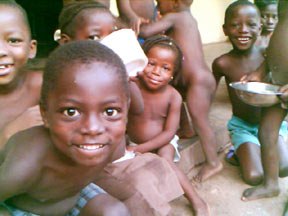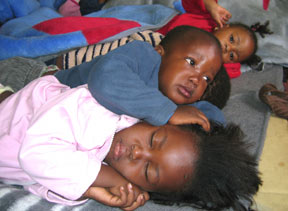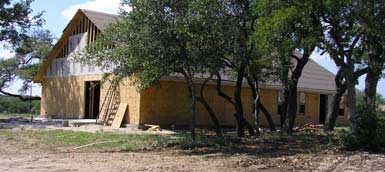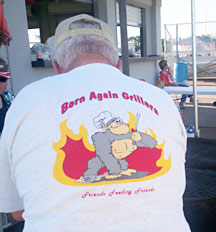Posted: 6/09/06
|
| When Pastor Jim Strickland talks about horsepower he may mean the chopper he rides or the equine variety. Strickland has served as pastor of the Mills County Cowboy Church six months. (Photo by George Henson) |
Western heritage churches
strive for cultural relevancy
By George Henson
Staff Writer
GOLDTHWAITE—Quicker than a bull can take two steps out of a chute, spin to his right, kick his heels to the sky and put his nose—and maybe a cowboy—in the dirt, Western heritage churches are springing up across the state.
In six years, the Baptist General Convention of Texas has helped start 54 Western heritage churches. In four months, from May through August, 31 more will be up and running. Ron Nolen, Western heritage congregational strategist for the BGCT, said while that is great, it’s only the beginning.
“There’s another 200 coming over the next hill with no end in sight,” he said.
One of the more recent starts—the six-month-old Mills County Cowboy Church—began when a group of men began to meet at the local livestock sale lot. The group grew in a month to about 15, and they moved into an abandoned feed store building.
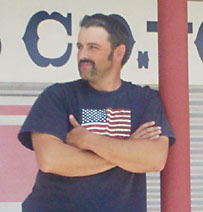 |
| Jim Strickland |
The group had grown to about 40 when Jim Strickland blew into town from Florida.
Strickland grew up around horses and cattle and had always had a desire to minister in that culture, but found himself as the pastor of a conventional, multi-staff, growing church of about 650.
“I had dismissed doing anything in this culture until I got on the Internet and heard about these crazy Texans that had found a way to make it work,” he recalled.
He arrived in Texas the same week as Hurricane Rita without any real plan, but a friend helped set up a meeting with Nolen. As Strickland sat in his hotel room the night before the meeting, he passed the time reading in Hill Country Magazine about a town called Goldthwaite he had never heard of before.
During their meeting the next morning, Nolen told Strickland Goldthwaite needed a pastor for a Western heritage church.
Strickland came to town to meet with the men who were interested in getting the church off the ground. They met in the abandoned feed store with no air conditioning, no ceiling, chairs from hunting blinds and roll-up doors that were raised to provide at least a little breeze.
“Sitting there in that broken-up feed store, I really thought I had missed God. I couldn’t wait to get out of there. I thought, ‘I’ll just shake some hands, kiss some babies and get back to Florida,’” he recalled.
But in an instant, that all changed.
“I was introduced to the men, took about three steps and turned around to make my short little speech before I left. But when I turned around and saw their faces, I knew this was the place that God had brought me to,” he said.
The building has since been fixed up a bit. The metal roll-up doors have been replaced with more conventional entrances, and fans and an air conditioner cool the building. The church also secured new folding chairs and added a ceiling.
Unadorned concrete floors and feed store signs on the outside help maintain the rural feel. A small stage for the worship band and a horse trough for baptisms don’t do anything to detract from that.
Some people didn’t understand Strickland’s decision to move to Texas to pastor a church in a feed store.
“Some people thought we were crazy—not knowing if we would have an income or anything, but we thought it was what God would have us do and it’s all worked out,” he said. He has a salary—a good one by Mills County standard’s, he said. And he runs a saddle shop where he does leather work of all kinds.
The saddle shop really is more a ministry opportunity than a financial bonanza, he said. It gives him one more opportunity to meet people in a place they can feel comfortable.
Strickland admits he had to make some adjustments as well. He had no problem with the boots and jeans, but he admits after so many years of giving an invitation at the end of the sermon, he launched into one or two before he caught himself. Cowboy churches generally give people a chance to respond to God’s direction by filling out a slip after church and leaving it to be followed up on later.
The system works in Mills County. The church has grown to about 130 people, and decisions have been recorded every week but two since Strickland arrived.
Another difference between the cowboy church and the conventional church he once served is the number of adults who make professions of faith in Christ, he noted. Of the dozens he has baptized so far, only two have been children.
“A lot of people will come up and say, ‘Preacher, I haven’t been in a church in 30 years.’ That makes you reevaluate what’s essential, because you have to grow them,” he explained.
First Baptist Church in Goldthwaite sponsors the Cowboy Church, and Pastor Doug Holtzclaw said the church has fulfilled a vision that was in place when the church was started.
“It’s done exactly what we were hoping it would do—reach people who weren’t going to church anywhere at all,” he said.
Not everyone the church has drawn has been from the cowboy culture, he has noticed.
“Not everyone there is a cowboy type, but they feel a freedom and acceptance there,” Holtzclaw said. “Now, I feel they would find that same acceptance here in our church, but the big, brick building is a barrier to some. They put their own expectations on themselves and think they have to dress a certain way to come here. There they feel more comfortable just coming as they are.”
Strickland also feels a freedom.
“This whole thing couldn’t be more liberating for me. All they expect me to do is preach the word and love the people, and that’s a pretty freeing expectation,” Strickland said. Freedom is one of the main things that attracts people to a cowboy church, he observed.
“The greatest thing about the cowboy church is that all the barriers of expectation are removed,” Strickland said.
The church recently completed paperwork to purchase 22 acres of land. Eventually, the church will move there, but the first priority is to build an arena. Right now, the church uses the county arena, but many other groups use it as well. An arena that belongs to the church will free it up for much more ministry, he said.
“The arena is the priority—we have a place to meet,” Strickland explained. “Some compare the arena for a cowboy church to the family life center of a conventional church, but I think it’s really much more important than that.”
From the first cowboy church in Ellis County to the church in Mills County to those who will soon be starting, all are founded on the same principles, Nolen said.
“First, it has to be done from the pure motivation of bringing lost people to a saving knowledge of Jesus Christ,” he said.
“Second, we need to be very conscious that often we do church too much for those in the church world and not enough for those outside the church. We have to make those outside the church the priority.”
The third priority is an approach found in George Hunter’s book Search for the Unchurched, he said. To reach people outside the church, there must be a thorough understanding of the culture, believers must be empowered and there needs to be pastoral care through small groups.
“So, the keys are to have a culturally relevant start-up pastor, a culturally relevant meeting place and a culturally relevant core group ready to do church radically—scripturally but ready to be a 21st century first century church,” he said.
The next training session of the Texas Fellowship of Cowboy Churches will be held Aug. 26-27 at Baylor University’s Truett Theological Seminary. “We have found a great ally in Truett Seminary and Paul Powell,” Nolen said. To register, call (888) 611-2651.
News of religion, faith, missions, Bible study and Christian ministry among Texas Baptist churches, in the BGCT, the Southern Baptist Convention ( SBC ) and around the world.


